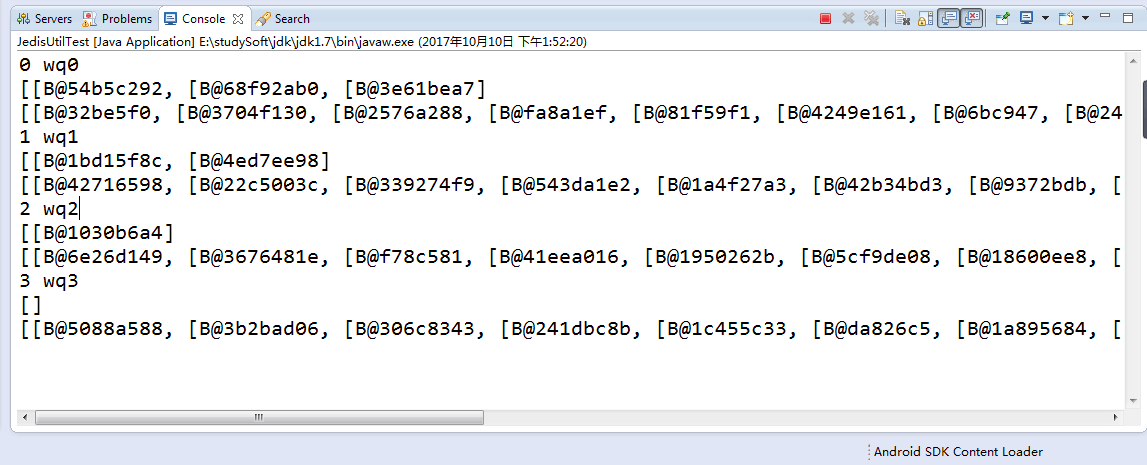Redis 任务队列(生产者消费者)
2017-10-10 14:00 如是我所闻 阅读(2861) 评论(0) 收藏 举报安装reids参考下面网址:
http://www.runoob.com/redis/redis-install.html
pom.xml中的jar包
1 <dependency> 2 <groupId>org.springframework.data</groupId> 3 <artifactId>spring-data-redis</artifactId> 4 <version>1.6.0.RELEASE</version> 5 </dependency> 6 7 <!-- jedis --> 8 <dependency> 9 <groupId>redis.clients</groupId> 10 <artifactId>jedis</artifactId> 11 <version>2.5.1</version> 12 </dependency>
Jedis的工具类JedisUtil
1 package demo3; 2 3 import java.util.List; 4 5 import redis.clients.jedis.Jedis; 6 public class JedisUtil { 7 private static Jedis jedis = null; 8 /** 9 * 存储REDIS队列 顺序存储 10 * @param key 字节类型 11 * @param value 字节类型 12 */ 13 public static void lpush(byte[] key,byte[] value){ 14 try { 15 jedis = RedisPool.getJedis(); 16 jedis.lpush(key,value); 17 } catch (Exception e) { 18 e.printStackTrace(); 19 }finally { 20 RedisPool.returnResource(jedis); 21 } 22 } 23 /** 24 * 存储REDIS队列 反序存储 25 * @param key 字节类型 26 * @param value 字节类型 27 */ 28 public static void rpush(byte[] key,byte[] value){ 29 try { 30 jedis = RedisPool.getJedis(); 31 jedis.rpush(key,value); 32 } catch (Exception e) { 33 e.printStackTrace(); 34 }finally { 35 RedisPool.returnResource(jedis); 36 } 37 } 38 /** 39 * 移除列表的最后一个元素,并将该元素添加到另一个列表并返回,就可以实现任务队列 40 * @param srckey 原队列的key 41 * @param dstkey 目标队列的key 42 */ 43 public static byte[] rpoplpush(byte[] srckey,byte[] dstkey){ 44 byte[] value = null; 45 try { 46 jedis = RedisPool.getJedis(); 47 value= jedis.rpoplpush(srckey,dstkey); 48 } catch (Exception e) { 49 e.printStackTrace(); 50 }finally { 51 RedisPool.returnResource(jedis); 52 } 53 return value; 54 } 55 /** 56 * 从列表中弹出一个值,将弹出的元素插入到另外一个列表中并返回它; 如果列表没有元素会阻塞列表直到等待超时或发现可弹出元素为止。 57 * @param srckey 58 * @param dstkey 59 * @param timout 60 * @return 61 */ 62 public static byte[] brpoplpush(byte[] srckey,byte[] dstkey,int timout){ 63 byte[] value = null; 64 try { 65 jedis = RedisPool.getJedis(); 66 value = jedis.brpoplpush(srckey,dstkey,timout); 67 } catch (Exception e) { 68 e.printStackTrace(); 69 } finally { 70 RedisPool.returnResource(jedis); 71 } 72 return value; 73 } 74 /** 75 * 设置实现任务队列的键和过期时间 76 * @param key 77 * @param timeout 78 */ 79 public static List<byte[]> brpop(byte[] key, int timeout){ 80 List<byte[]> result = null; 81 try { 82 jedis = RedisPool.getJedis(); 83 result=jedis.brpop(0,key); 84 } catch (Exception e) { 85 e.printStackTrace(); 86 } finally { 87 RedisPool.returnResource(jedis); 88 } 89 return result; 90 } 91 /** 92 * 移除队列中的最后一个元素并显示最后一个元素 93 * @param key 94 * @return 95 */ 96 public static byte[] rpop(byte[] key) { 97 byte[] bytes = null; 98 try { 99 jedis = RedisPool.getJedis(); 100 bytes = jedis.rpop(key); 101 } catch (Exception e) { 102 e.printStackTrace(); 103 } finally { 104 RedisPool.returnResource(jedis); 105 } 106 return bytes; 107 } 108 }
用到的工具类RedisPool
1 package demo3; 2 3 import redis.clients.jedis.Jedis; 4 import redis.clients.jedis.JedisPool; 5 import redis.clients.jedis.JedisPoolConfig; 6 7 public class RedisPool { 8 private static final JedisPool jedisPool; 9 private static final String REDIS_IP="127.0.0.1"; 10 private static final int REIDSPORT=6379; 11 12 static { 13 jedisPool=new JedisPool(new JedisPoolConfig(), REDIS_IP, REIDSPORT); 14 } 15 16 public static Jedis getJedis(){ 17 return jedisPool.getResource(); 18 } 19 20 public static void returnResource(Jedis jedis){ 21 jedisPool.returnResource(jedis); 22 } 23 }
用到的工具类SerialoizebleUtil
package demo3; import java.io.ByteArrayInputStream; import java.io.ByteArrayOutputStream; import java.io.ObjectInputStream; import java.io.ObjectOutputStream; public class SerialoizebleUtil { public static Object ByteToObject(byte[] bytes) { Object obj = null; try { // bytearray to object ByteArrayInputStream bi = new ByteArrayInputStream(bytes); ObjectInputStream oi = new ObjectInputStream(bi); obj = oi.readObject(); bi.close(); oi.close(); } catch (Exception e) { System.out.println("translation" + e.getMessage()); e.printStackTrace(); } return obj; } public static byte[] ObjectToByte(java.lang.Object obj) { byte[] bytes = null; try { // object to bytearray ByteArrayOutputStream bo = new ByteArrayOutputStream(); ObjectOutputStream oo = new ObjectOutputStream(bo); oo.writeObject(obj); bytes = bo.toByteArray(); bo.close(); oo.close(); } catch (Exception e) { System.out.println("translation" + e.getMessage()); e.printStackTrace(); } return bytes; } }
实体类MessageUtil,实现存入Redis中的是对象,不是单单的基本类型,存入Redis中的对象需要实现序列化接口
1 package model; 2 3 import java.io.Serializable; 4 5 public class Message implements Serializable{ 6 7 /** 8 * 9 */ 10 private static final long serialVersionUID = 1L; 11 12 private String titile; 13 private String info; 14 15 public Message(String titile,String info){ 16 this.titile=titile; 17 this.info=info; 18 } 19 20 public String getTitile() { 21 return titile; 22 } 23 24 public void setTitile(String titile) { 25 this.titile = titile; 26 } 27 28 public String getInfo() { 29 return info; 30 } 31 32 public void setInfo(String info) { 33 this.info = info; 34 } 35 36 37 }
使用两个Redis列表,一个队列作为生成者,一个队列作为消费者,加上线程实现两个列表,一个列表产生任务,通过任务队列,另一个列表处理任务
1 package demo3; 2 3 import redis.clients.jedis.Jedis; 4 5 public class InitList { 6 public static byte[] rediskey = "key".getBytes(); 7 public static byte[] dstkey = "dstkey".getBytes(); 8 public static long time = 0; 9 public static int i = 0; 10 11 public static void main(String args[]) { 12 Jedis jedis = RedisPool.getJedis(); 13 while (true) { 14 try { 15 MessageUtil msg1 = new MessageUtil(); 16 msg1.setId(i); 17 msg1.setContent("wq" + i); 18 // JedisUtil.lpush(rediskey,SerialoizebleUtil.serialize(msg1)); 19 JedisUtil.lpush(rediskey, SerialoizebleUtil.ObjectToByte(msg1)); 20 time = 2000; 21 System.out.println("success" + i); 22 System.out.println(jedis.lrange(rediskey, 0, 100)); 23 i++; 24 Thread.sleep(time); 25 } catch (InterruptedException e) { 26 e.printStackTrace(); 27 } 28 } 29 } 30 }
控制台输出如下,说明一直在向列表中插入新产生的对象

再开启一个线程,使用Redis中的brpoplpush方法,实现任务队列原理
1 package demo3; 2 3 import redis.clients.jedis.Jedis; 4 5 public class JedisUtilTest { 6 public static byte[] rediskey = "key".getBytes(); 7 public static byte[] dstkey = "dstkey".getBytes(); 8 public static long time = 0; 9 10 public static void main(String args[]) { 11 Jedis jedis = RedisPool.getJedis(); 12 while (true) { 13 try { 14 byte[] bytes = JedisUtil.brpoplpush(rediskey, dstkey, 0); 15 MessageUtil msg = (MessageUtil) SerialoizebleUtil.ByteToObject(bytes); 16 if (msg != null) { 17 System.out.println(msg.getId() + " " + msg.getContent()); 18 } 19 time = 3000; 20 System.out.println(jedis.lrange(rediskey, 0, 100)); 21 System.out.println(jedis.lrange(dstkey, 0, 100)); 22 Thread.sleep(time); 23 } catch (InterruptedException e) { 24 e.printStackTrace(); 25 } 26 } 27 } 28 }
控制台输出如下,上面的列表存的是刚才产生的6个对象,下面圈出来的是新的列表,可以看出新的列表的对象在递增,说明成功实现了任务队列原理



 浙公网安备 33010602011771号
浙公网安备 33010602011771号